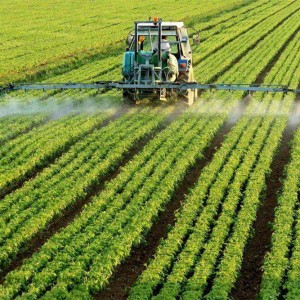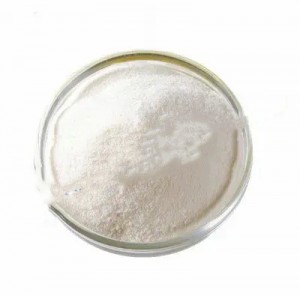High Quality Pesticide Intermediates Intermedios de plaguicidas
| PRODUCT NAME | CAS | Description |
| Diniconazole | 83657-24-3 | Other Chinese names: Su Baoli English common name: diniconazole Dinconazole Dinconazole Molecular formula: C15H17Cl2N3O CAS registration number: 83657-24-3 Pesticide category: fungicide Chemical class: azoles Mode of action: protection, treatment and systemic Chemical name: (E)-(RS)-1-(2,4-dichlorophenyl)-4,4-dimethyl-2-(1H-1,2,4-triazol-1-yl) Pent-1en-3-ol Analysis method: gas spectrometry, liquid spectrometry (Sumitomo Chemical Co., Ltd) Physical and chemical properties: colorless crystal, melting point about 134 to 156℃, vapor pressure 2.93mPa (20℃), 4.9mPa (25℃), density 1.32 (20℃), solubility in water 4mg/L (25℃), acetone, methanol 95, xylene 14, hexane 0.7 (g/kg, 25°C), stable to light, heat and moisture. Toxicity: low toxicity, the acute oral LDso in mice is 639mg/kg, and the acute percutaneous LD50 in mice is >5 000mg/kg. Features and Use of Diniconazole Function characteristics: It is a triazole fungicide, which inhibits 14α-demethylation in the biosynthesis of ergosterol in fungi, causing ergosterol deficiency, resulting in abnormal fungal cell membranes, and ultimately fungal death, with a long-lasting effect. Safe for humans and animals, beneficial insects and the environment. It is a broad-spectrum fungicide with protection, treatment and eradication effects; it has special effects on various plant diseases such as powdery mildew, rust, smut and scab caused by cyst fungi and basidiomycetes. In addition, it also has good effect on diseases caused by Cercospora, Coccidioides, Sclerotinia, Sclerotium, Rhizoctonia. Dinconazole toxicity, the acute oral LD50 of pure rat is 639 mg/kg, slightly irritating to rabbit eyes, moderate toxicity to fish, and LD50 to birds is 1 500-2 000 mg/kg. [Formulation] 12.5% ultrafine wettable powder. [Usage method] Use 3 000-4 000 times of 12.5% WP for the control of flowers, turfgrass rust, white silk disease, etc.; The dosage for the control of wheat powdery mildew and rice sheath blight is 32-64 g/mu. [Precautions] Avoid contaminating the skin with the agent during the application process; the agent should be stored in a cool and dry place; after application, it will inhibit the growth of a few plants. |
| Paclobutrazol | 76738-62-0 | Paclobutrazol is a triazole plant growth regulator developed in the 1980s and an inhibitor of endogenous gibberellin synthesis. It can also increase the activity of rice indole acetic acid oxidase and reduce the level of endogenous IAA in rice seedlings. Significantly weakened the top growth advantage of rice seedlings and promoted the growth of lateral buds (tillers). The appearance of the seedlings is short and strong with many tillers, and the leaves are dark green. Root system developed. Anatomical studies have shown that paclobutrazol can make the cells of rice seedling roots, leaf sheaths and leaves smaller, and the number of cell layers in each organ increases. Tracer analysis showed that paclobutrazol could be absorbed by rice seeds, leaves and roots. Most of the paclobutrazol absorbed by leaves was retained in the absorption part and seldom transported outward. Low concentration of paclobutrazol increases the photosynthetic efficiency of rice seedling leaves; high concentration inhibits photosynthetic efficiency, increases root respiration intensity, reduces aerial part respiration intensity, increases leaf stomatal resistance, and reduces foliar transpiration. The agricultural application value of paclobutrazol lies in its control effect on crop growth. It has the effects of delaying plant growth, inhibiting stem elongation, shortening internodes, promoting plant tillering, promoting flower bud differentiation, increasing plant stress resistance, and increasing yield. This product is suitable for rice, wheat, peanuts, fruit trees, tobacco, rapeseed, soybeans, flowers, lawns and other crops (plants), and the use effect is remarkable. 1. Rice In the long-aged seedling field, at the seedling stage of 1 leaf and 1 heart, spray 300g/667m2 of 10% wettable powder with 50L of water, which can control the height of the seedling and cultivate strong seedlings with many tillers and strong rooting ability. After transplanting, in the ear differentiation period, spray 180g/667m2 of 10% wettable powder with 50-60L of water, which can improve the plant type, make it dwarf, and reduce lodging. 2. Fruit trees The application effect is remarkable on apple, pear, peach and cherry trees, and can be used for soil treatment, trunk coating and foliar spray. Soil treatment works best. For soil treatment, use 10-15g of 10% wettable powder per cubic meter of canopy, in the form of a similar annular fertilization ditch, 30cm wide and 20cm deep, with the principle of exposing the roots without hurting the roots, sprinkle the medicine into the ditch and cover it with soil. Water before and after application to maintain soil moisture. Apply 150 to 300 times of 15% wettable powder to dry. Use 15% wettable powder 75-150 times liquid foliar spray, for young trees, can make the crown dwarf, compact, early flowering and fruit; for adult trees, it can inhibit the growth of new shoots, increase yield and improve quality. 3. Soybeans, rapeseeds, cotton, flowers, wheat At the initial flowering stage of soybeans, spray 10% wettable powder 500 times liquid to the whole plant, which can dwarf the plant height of soybeans, promote branching and increase yield. When the rape seedlings have 2 leaves and 1 heart to 3 leaves and 1 heart, spray 10% wettable powder 500 to 1000 times liquid, which can prevent tall seedlings and prevent freezing. Application on cotton seedlings can prevent the occurrence of tall seedlings and frost damage. Applied to flowers, it can make the plant type tall and straight. Beautiful pose. Applied to wheat, it can increase tillering and resist lodging. |
| Mepiquat chloride | 24307-26-4 | Product Name: Mepiquat 1,1-Dimethyl piperidinium English Name: Mepiquat 1,1-Dimethyl piperidinium Molecular Structure: Molecular formula: C7H16N Molecular weight: 114.21 Peptamine can be absorbed by roots, twigs and leaves, and is quickly transmitted to other parts without residue or carcinogenicity. Methylpiperium is a new type of plant growth regulator, which has a good systemic effect on plants. It can promote the reproductive growth of plants; inhibit the crazy growth of stems and leaves, control side branches, shape ideal plant types, increase the number and vitality of roots, increase fruit weight and improve quality. Widely used in cotton, wheat, rice, peanuts, corn, potatoes, grapes, vegetables, beans, flowers and other crops. Commodity name: diquateramine, metrophin, pyridine, methanogen, etc. Generic Name: Methylpiperidine Chemical Name: N·N—Dimethylpiperidine Chloride Appearance: The original drug is white or light yellow powder. Active ingredients: placed at room temperature for two years. The active ingredients are basically unchanged, and it is easy to absorb moisture and agglomerate, but it does not affect the efficacy. Safety: low toxicity, non-flammable, non-corrosive, non-irritating to respiratory tract, skin and eyes. Harmless to fish, birds and bees. In the event of poisoning, gastrointestinal cleansing should be performed. Toxicity: The acute oral toxicity LD50 of mice with 96% original powder is 1032 (male) and 920 (female) mg/kg, and the acute dermal toxicity LD50 is greater than 1000 mg/kg.In 1998, the implementation of the industry standard: HG2856--1997 meclizine (preparation of the original drug of methylphenidate) Implementation of the standard: HG2857-1997 Content: 250g/L methylphenidate Appearance: white or light yellow transparent liquid. Properties: The effect is the same as the original drug. During storage and transportation, it should be protected from moisture and sunlight, and should not be mixed with food, seeds, and feed, avoid contact with skin and eyes, and prevent inhalation through the nose and mouth. |
| P-chloranil | 118-75-2 | Tetrachlorobenzoquinone, tetra-chloro-benzoquinone, also known as tetrachloro-p-benzoquinone, tetrachloroquinone, chloran, etc. Molecular formula C6Cl4O2, molecular weight 245.88. Those precipitated from acetic acid or acetone are golden yellow flake crystals, and those precipitated from benzene or toluene or obtained by sublimation are monoclinic yellow columnar crystals. Has an unpleasant persistent odor. There is sublimation. Insoluble in water, insoluble in cold ethanol, cold petroleum ether, soluble in ether, chloroform, carbon tetrachloride and carbon disulfide. It is slowly dissolved in alkaline solution, and when there is air, a reddish-brown to purple precipitate (potassium tetrachloro-p-benzoquinone) is formed. It can be used as a non-systemic fungicide for seed sterilization of grains, peanuts, vegetables, cotton, and beans, as well as dye intermediates, pesticide raw materials, and tanning industries.Appearance: Golden yellow leaf crystal or yellow crystal powder. Density (g/mL, 25℃): 1.97 Gas phase standard claimed heat (enthalpy) (kJ/mol): -185.7 Melting point (ºC): 290 Liquid Standard Claimed Heat (Enthalpy) (kJ/mol): -158.0 Solubility: soluble in sodium hydroxide solution, ether, slightly soluble in alcohol, insoluble in chloroform, carbon tetrachloride and carbon disulfide, almost insoluble in cold alcohol, insoluble in water.1. This product is used as a vulcanizing agent for natural rubber, butyl synthetic rubber, nitrile rubber and neoprene. 2. Mainly used in the manufacture of butyl rubber inner tubes, outer tubes, vulcanized bladders, heat-resistant products, insulated wires, etc. It can be used alone or mixed with sulfur and other vulcanization accelerators (usually with accelerator DM) to manufacture cables and sponge rubber products. The dosage is 0.5% to 4.0%. For example, adding 5% to 20% can improve the bonding strength between the rubber compound and the fabric material. 3. This product is used in the manufacture of anti-cancer drugs iminoquinone, cancer inhibitor powder, and diuretic spironolone; it is also used as a dye intermediate and agricultural seed dressing agent. 4. Used as oxidant and pesticide. Used in the manufacture of tetrachloroquinone electrodes and organic synthesis. 5. Used as a chromogenic reagent for the photometric determination of isoniazid. Also used in organic synthesis, electrode preparation of tetrachloranil. |
| 8-Hydroxyquinoline | 148-24-3 | 8-hydroxyquinoline is an organic compound. The molecular formula is C9H7NO, white or yellowish crystalline or crystalline powder. It is insoluble in water and ether, soluble in ethanol, acetone, chloroform, benzene or dilute acid, and can sublimate. It can be used as antiseptic, disinfectant, insecticide and transcriptional inhibitor. 1. Widely used in the determination and separation of metals. Precipitant and extractant for precipitating and separating metal ions, can complex with the following metal ions: Cu?+2, Be?+2, Mg?+2, Ca?+2, Sr?+2, Ba?+2, Zn?+2, Cd?+2, Al?+3, Ga?+3, In?+3, Tl?+3, Yt?+3, La+3, Pb?+2, B?+3, Sb ?+3, Cr?+3, MoO?+22, Mn?+2, Fe?+3, Co?+2, Ni?+2, Pd?+2, Ce?+3 1. Used as a pharmaceutical intermediate, it is the raw material for synthesizing Kexielining, Clioquinoline, and Promethazine, as well as an intermediate for dyes and pesticides. This product is an intermediate of halogenated quinoline anti-amebic drugs, including quiniodoform, chloroiodoquinoline, diiodoquinoline, etc. These drugs exert anti-amebic effects by inhibiting intestinal commensal bacteria, and are effective against amoebic dysentery, but have no effect on extra-intestinal amoebic parasites. It has been reported abroad that this class of drugs can cause subacute spinal optic neuropathy, so the drug has been banned in Japan and the United States, and the disease caused by diiodoquine is less common than clioquinoline. 8-Hydroxyquinoline is also an intermediate for dyes and pesticides. Its sulfate and copper salts are excellent preservatives, disinfectants and mold inhibitors. This product is a complexometric titration indicator for chemical analysis.2. It is used as a complexing agent and extraction agent for precipitation and separation of metal ions, and can be used with Cu+2, Be+2, Mg+2, Ca+2, Sr+2, Ba+2, Zn?+2, Cd+ 2. Al+3, Ga+3, In+3, Tl+3, Yt+3, La+3, Pb+2, B+3, Sb?+3, Cr+3, MoO?+22, Mn+ 2. Complexing of various metal ions such as Fe+3, Co+2, Ni+2, Pd+2, Ce+3, etc. Standard for the Determination of Heterocyclic Nitrogen by Organic Microanalysis, Organic Synthesis. It is also an intermediate for dyes, pesticides and halogenated quinoline anti-amebic drugs. Its sulfate and copper salts are excellent preservatives. 3. Adding epoxy resin adhesive can improve the bonding strength and heat aging resistance to metals (especially stainless steel), and the dosage is generally 0.5 to 3 parts. It is an intermediate of halogenated quinoline anti-amebic drugs, as well as an intermediate of pesticides and dyes. It can be used as antifungal agent, industrial preservative and stabilizer of polyester resin, phenolic resin and hydrogen peroxide, and it is also a complexometric titration indicator for chemical analysis.4. This product is an intermediate of haloquinoline drugs, dyes and pesticides. Its sulfate and copper salt are excellent preservatives, disinfectants and mildew inhibitors. The maximum allowable content (mass fraction) in cosmetics is 0.3%, sunscreen products and products for children under 3 years old (such as talcum powder) are prohibited, and "prohibited for children under 3 years old" should be indicated on the product label. When dealing with bacterial infected skin and bacterial eczema, the mass fraction of 8-hydroxyquinoline in lotion is 0.001% ~ 0.02%. It is also used as a disinfectant, antiseptic and bactericide, with strong anti mold effect. The content (mass fraction) of 8-hydroxyquinoline potassium sulfate in skin care cream and lotion is 0.05% ~ 0.5%. |
| 8-Hydroxyquinoline sulfate | 134-31-6 | 8-Hydroxyquinoline sulfateChinese name: 8-hydroxyquinoline sulfateChinese synonyms: 8-hydroxyquinoline sulfate; 8-hydroxyquinoline sulfate (2:1) (salt); 8-hydroxyquinoline sulfate; 8-hydroxyquinoline sulfate; quinoxetine; quinoline sulfate oxide; Hydroxyquinoline sulfate; 8-quinolinol sulfateEnglish name:8-Hydroxyquinoline sulfate English synonyms:8-hydroxy-chinolin-sulfat;8-Hydroxyquinolinesulfuricacidsalt;8-Quinolinol,hydrogensulfate(2:1);8-Quinolinol,sulfate(2:1)(salt);albisal;cryptonol;happy;khinozol CAS Number: 134-31-6 Molecular formula: 2C9H7NO.H2O4S Molecular weight: 388.4 EINECS No.: 205-137-1 Character description Yellow or light yellow crystalline powder, easily soluble in water, slowly soluble in ethanol, insoluble in ether, decomposed by alkali, and hygroscopic. Melting point: 175-178°C 5% aqueous solution pH: 2.4-3.5 quality specification Purity: ≥98% Ignition residue: ≤0.2% Instructions for use It is a powerful metal chelating agent, which can precipitate a variety of heavy metals and has systemic bactericidal activity. It is mainly used in forestry, medicine, chemical industry, cosmetics and so on. Packing: 25KG/cardboard drum |
| 8-hydroxyquinoline, copper(ii) salt | 10380-28-6 | 8-hydroxyquinoline copper is a chemical substance with the molecular formula C18H12N2O2Cu. Appearance and properties: yellow to green powder. Density: 1,68g/cm3. Melting point: 240 ° C (dec.) (lit.). Boiling point: 267 º C. Flash point: 143.1 º C. Storage conditions: the warehouse is ventilated, low temperature and dry. It is used as a fungicide to prevent and control apple tree ring rot.Chinese name: 8-hydroxyquinoline copper English name: oxine copper CAS No.: 10380-28-6 Molecular weight: 351.85PSA: 44.24000LogP: 4.15330 Appearance and properties: yellow to green powder Density: 1,68 g/cm3 Melting point: 240 ° C (dec.) (lit.) Boiling point: 267 º C at 760 mmHg Flash point: 143.1 º C Storage condition: ventilated warehouse, low temperature and dry It is used as a fungicide to prevent and control apple tree ring rot.Precautions: The operation should be trained in a timely manner, and the operator procedures should be strictly enforced. The operation should be locally ventilated or ventilated. Reduce eye and skin contact and reduce heat. Keep away from fire and heat sources, and cigarettes are strictly prohibited in the workplace. Use explosion-proof ventilation systems and equipment. Canned, should have device control, and have a grounding point to prevent accumulation. Avoid contact with other incompatible substances. When packing, it should be lightly loaded and unloaded to prevent damage to the packaging and container. Empty containers may have residue. After eating and drinking, it is forbidden to enter or leave the workplace. Equipped with the corresponding number and quantity of fire fighting equipment and launch processing equipment. Precautions: Store in a cool, ventilated warehouse. Items that should be used and taboo should be placed in mixed storage. Keep container tightly closed. Keep away from fire and heat sources. The warehouse must be equipped with lightning protection equipment. The exhaust system should direct it away from the new grounding device. Explosion-proof, ventilated lighting setup. The use of equipment and tools that are prone to sparks is prohibited. Reserves should be stocked with spare equipment and suitable materials. |
| Chlorendic acid | 115-28-6 | Chlorobridged acids are widely used as intermediates of many compounds. It has good flame retardant, anti-corrosion and curing properties, and the oxygen index of flame retardant materials can be increased to more than 32. Flame retardant resin, anti-corrosion resin, anti-corrosion coating, plasticizer, laminated plastic and adhesive made from chlorobridge acid are widely used in plastics, printing and dyeing, paint, printed circuit board, glass fiber, special chemical equipment, etc. It can also be used to produce agricultural pesticides containing chlortetracyclic acid structure. As the chlorine content in HET acid is up to 54.4%, it is highly stable to water, alcohol, alkali, etc., so the synthesized resin has good corrosion resistance and flame retardancy. It has been widely used abroad in chlor alkali or high temperature wet chlorine, hydrochloric acid, salt water and other occasions in the pulp industry, as well as sewage, waste oil, waste residue, isopropanol, sulfur dioxide and other fields.Appearance: white, dust-free tiny crystal Purity: above 99.0% Chlorine content: 54.4% ± 0.2% Color: below 50 (Heinstein color value) Volatile matter: below 1.0% |
| Chlorendic anhydride | 115-27-5 | Chlorine bridged anhydride is an organic compound with the chemical formula C9H2Cl6O3.CAS registration number: 115-27-5 Chinese name: chlorobridged anhydride; 1,4,5,6,7,7-Hexachloro-5-norbornene-2,3-dicarboxylic anhydridePhysicochemical property editing broadcast melting point: 235-240º C Water solubility: insoluble property description white crystal. Melting point 231-235 ℃. Solubility (g/100g): benzene is 40.4, hexane is 4.5, acetone is 127.0, carbon tetrachloride is 6.7, slightly soluble in water and hydrolyzed to chlorobridge acid. Both chlorobridged anhydride and chlorobridged acid are reactive flame retardants, suitable for unsaturated polyester, polyurethane and epoxy resin, as well as curing agent for epoxy resin. The thermal deformation temperature of the epoxy resin cured by the product is about 180 ℃, and the drug resistance is good. Chlorobridge acid is also used as a dye intermediate and insecticide. It is also used as a flame retardant for fabrics.Other information is compiled from the reaction of hexachlorocyclopentadiene and maleic anhydride. Mix hexachlorocyclopentadiene and maleic anhydride in the solvent chlorobenzene at a molar ratio of 1:1.1. After 7-8h reaction at 140-145 ℃, add the reaction product to water for hydrolysis. The chlorobridge acid obtained by hydrolysis at 70 ℃ becomes an oily liquid. When heated to 96-97 ℃, it is miscible with water. After cooling, it becomes a chlorobridge acid containing one crystal water (Hetacid [115-28-6]). If the reaction product is crystallized with hot water and dilute acetic acid, the monohydrate is dried at 100-105 ℃ to obtain chlorobridged anhydride. |




